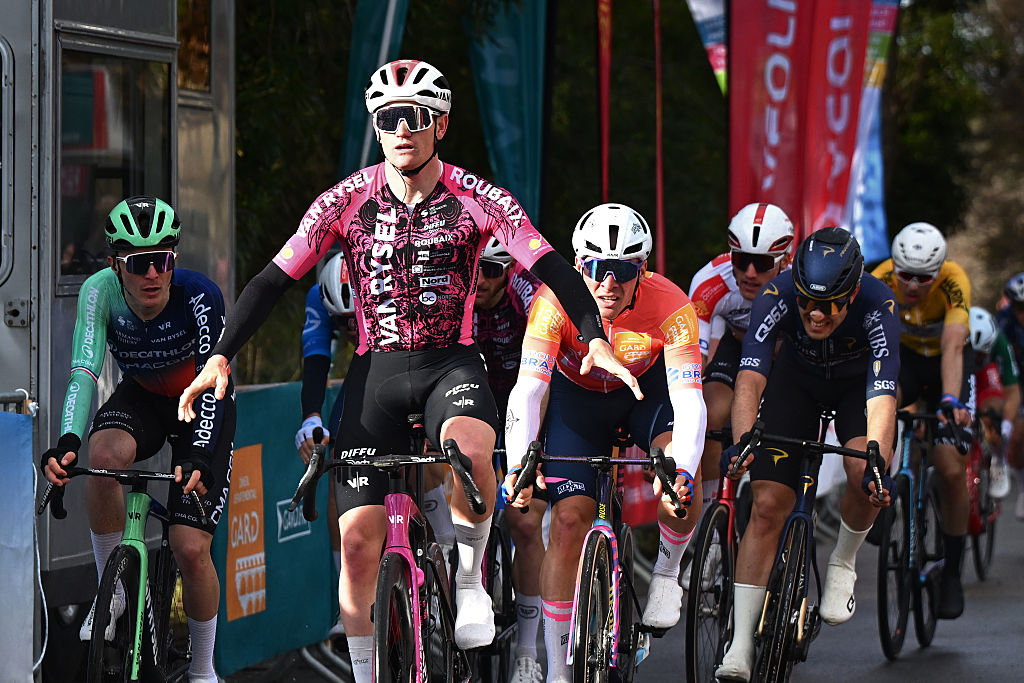Contador: Giro-Tour double is only impossible until someone makes it possible
Exclusive: Spaniard on what 2015 could mean for his legacy
The latest race content, interviews, features, reviews and expert buying guides, direct to your inbox!
You are now subscribed
Your newsletter sign-up was successful
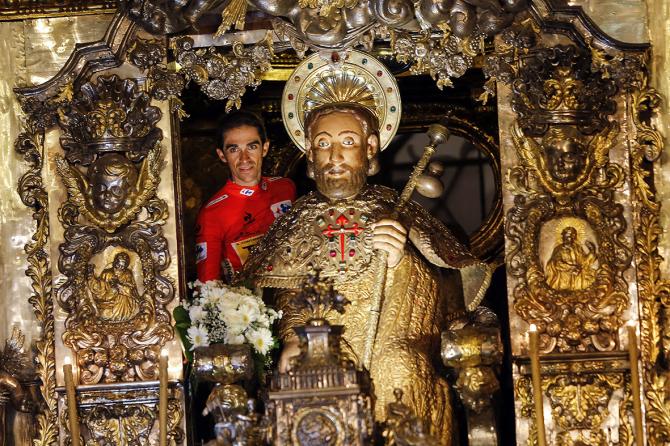
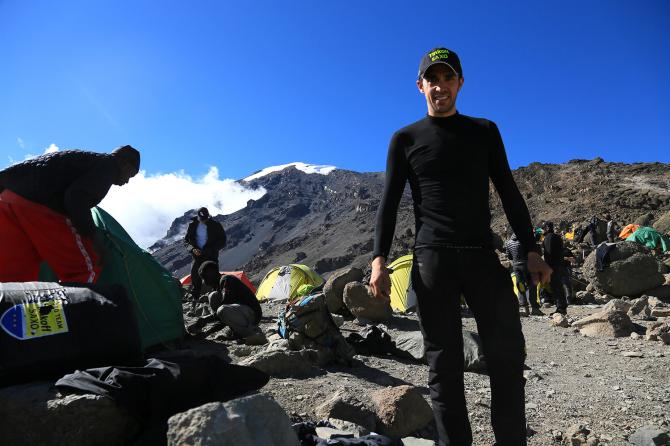
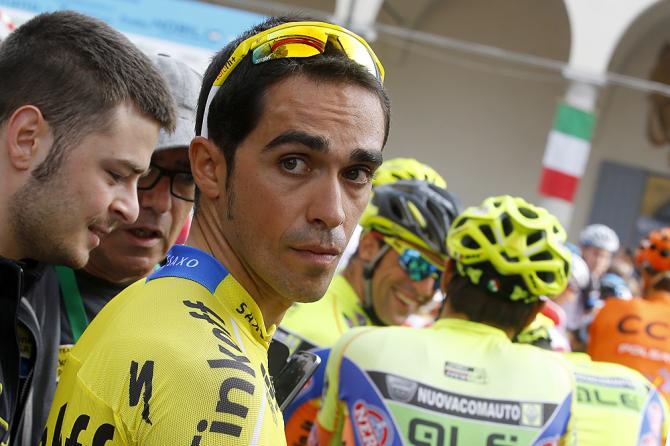
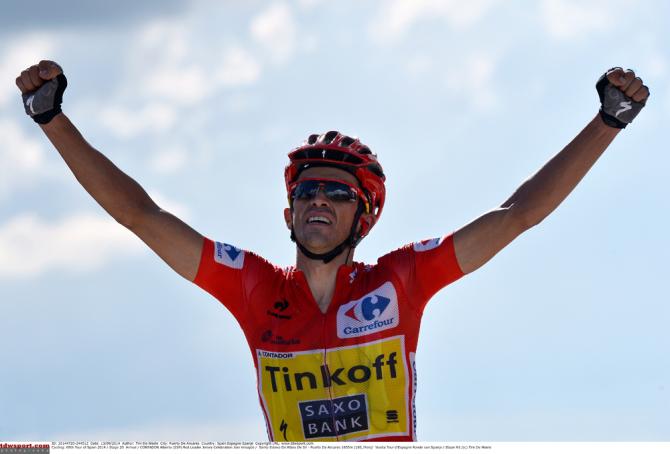
Alberto Contador (Tinkoff-Saxo) is well aware that his Giro d'Italia and Tour de France ambitions are a risk but the 2014 Vuelta a España winner is spurred on by the twin challenges of proving doubters wrong and cementing his legacy in the annals of cycling history.
If the Spaniard succeeds in his target of winning the Giro in May before recovering and then claiming the Tour de France, he would hold all three Grand Tour titles at the same time, a feat that would arguably place him among the very best riders the sport has ever seen.
"It's partly about legacy, this is true, and I will try and it will either work or it won't," Contador says at the Tinkoff-Saxo training camp in Gran Canaria.
Following a full day of training on the bike and meetings with the team management, a relaxed Contador sits down with Cyclingnews to take stock after what has been a whirlwind twelve months.
"I love cycling and it's a big part of my life, but every year my plans are roughly the same in terms of targets, whether it's the Tour, the Giro or the Vuelta. This Giro and Tour challenge, it's something new, it's different."
"I have one opinion," he continues, raising his index finger to emphasise his point. "When I saw that people said that the Giro and Tour were impossible to win together I took a step back and thought, 'well it's only impossible until someone makes it possible.' Why do people think it's impossible? I mean if I go to the Giro and win, and I then recover well why can't I think take on the Tour? Of course, I know it's going to be difficult but there's a chance. That's my opinion, and that's what's in my head and motivating me."
Contador is arguably the Grand Tour rider of his generation with two Tours, a Giro and three Vueltas on his palmarès. It's a feat that's all the more impressive when compared with the respective hauls of closet rivals. Vincenzo Nibali has won three Grand Tours in the course of his career, while Chris Froome has just one in his trophy cabinet.
The latest race content, interviews, features, reviews and expert buying guides, direct to your inbox!
Would a Giro-Tour double, which hasn't been managed since Marco Pantani's 1998 season, put Contador among the best the sport has ever seen?
"That’'s for others to talk about when they want to look at statistics but I know that if I can win these challenges then it will be incredible. I know how hard you need to work to win one major race and the sacrifices you need to make. Some think it comes easy and that you don't need to work hard if you have a lot of success but trust me, that's not true. You need to work even harder than the rest."
At this stage, Contador's race programme is almost set in stone. He will start the year at the Ruta del Sol before defending his Tirreno-Adriatico crown in March. From there he will travel to the Volta a Catalunya.
"Then it's the Giro d'Italia, perhaps a small race during my recovery period and then the Tour de France. That recovery time is going to be crucial, though, and we've not finalised that part yet," he says.
"People think that I've been in this position before but that's not really the case. In 2011, I only found out that I was riding the Tour ten days before the start of the race. Originally only the Giro was on the cards but then the Tour organisers told me that I needed to go," he says.
"This time around it's different because we're making a real programme and plan and we start with both races as objectives."
The 31-year-old, who hails from Pinto on the outskirts of Madrid, is no fool when it comes to the rigours and demands of racing. He is well aware of the magnitude of the challenges ahead. He will need to tailor his race schedule accordingly, while the window between the two Grand Tours could be the most critical part of his campaign. After all, he'll be facing up to Froome, Nairo Quintana and Nibali, who have all made the Tour de France their single focal point in the calendar.
"I realise that this is a really difficult ambition because there are 33 days between the Giro and the Tour, and that recovery period is really hard to manage. It's a risk, I know that, because there are rivals out there who will just concentrate on one objective, whether it's the Tour de France or the Giro d'Italia."
But Contador is not a rider who likes to play things safe when a special target, or in this case two, are on the horizon.
"There are more guarantees in reaching top form if you take that single race approach but for me it’s something different," he adds, pointing out how his ambitions stretch above his rivals. "It's a risk, because maybe I'll win one, maybe two or maybe I'll win nothing but this is my calendar and we'll see how it turns out.
"It's a bit like the time I attacked at Fuente Dé in the Vuelta a España. People think it's not possible, they say it's too hard to aim for three, to aim for two Grand Tours, and I know it will be hard but in my head I'm going to be ready for it.
"That's really the difference to 2011. I don't know if my legs will be ready but in my head I'll be ready. I have the confidence of the people around me and it's my decision but the hard work starts now."
2011 the imperfect blueprint
While Contador's 2011 Giro win – although eventually stripped as part of the sanction for his 2010 positive test for Clenbuterol – and his ride at the Tour de France in 2011 illustrate that he can compete at both races in a calendar year, the Spaniard believes that the outcome of that year's Tour is skewed, not just by his late decision to ride, but also by several events that transpired on the road.
"You can analyse all you want but the difference, like I said, was that in 2011 the Tour wasn't on the original plan. It was only at the last moment that I was sent to the Tour. But let's analyse the Tour that year because there's a lot to understand," he says.
"Day one, I had a crash and I lost around one minute twenty on all my rivals. Then it's the team time trial and I lose another 40 seconds. So after two key days of racing I'm already two minute down. That first crash wasn't too bad and I almost win a stage against Cadel Evans but then just before the mountains I have another crash with [Vladimir] Karpets and my knee ends up looking like a mess and I say to Bjarne that I don't think I can recover but he wants me to carry on.
"So I keep on fighting and decide to just recover through the Pyrenees without attacking. I get through that part and lose just a bit of time but then in the Alps I have one bad day because of hunger knock on the Galibier. That's where I lost the chance of winning."
If Contador was out of the running by the time Andy Schleck claimed a famous win atop the Galibier, then his response the following day was anything but sheer bravado. After just 15km of racing on the road to Alpe d'Huez, the Spanish rider attacked, leaving behind a trail of chaos, confusion and panic as his rivals struggled both tactically and physically. It was a do or die play that almost turned the race on its head and although it ultimately failed – Contador would eventually finish fifth overall – it provided him with the knowledge that back-to-back Grand Tours could be won.
"For me, that day was more important than a lot of my victories," he says. "I didn't win but it gave me a lot of heart. So if I hadn't lost that time in the first week, and if we had a little bit of a stronger team then I could have been in for the overall win."
A clear head after setbacks
After a lacklustre 2013 in which he failed to win a single stage race, Contador bounced back in emphatic style this year. He took a stage at the Volta ao Algarve before enforcing his status on the comeback trail with two stage wins and the overall victory at Tirreno-Adriatico. A stage and the overall at the Tour of the Basque Country soon followed and although victory at the Dauphiné slipped through his fingers, he looked more than a match for Chris Froome ahead of the Tour de France.
Disaster struck on stage ten of the Tour, however, when a crash robbed him of the chance to compete for a third title and left him with a fractured bone in his leg.
"I have a strong head. Ever since my major accident," he says, pointing to his temple and the lengthy scar that acts as a reminder of the operation for a cerebral cavernoma in 2004 that threatened not just career but his life.
"Since then I've always remained grounded and humble. That time in my life gave me perspective and it means that when I have setbacks in life and in my career I can understand what’s important and what's not.
"So when I think about this year's Tour," he says before pausing. "I never trained as hard as when I did for this year's Tour de France. I've never been that skinny, that fit or that motivated but you know that in cycling you can't control everything. You don't know when you're going to crash but when I look at the speed of that crash, at 77kph, and realise that I only broke my tibia, I have to look at the balance. It was of course tough moment, of course it was, but you recover from setbacks and at the Vuelta I showed that."
An advantage over Froome?
At the Vuelta this year, Contador not only showed that he had recovered from his tibia break but that he was close to his very best. Both he and Froome lined up after crashes at the Tour and the race was decided by a number of mountain showdowns before Contador finally put the Team Sky rider to the sword on the Ancares.
Psychologically, both Contador and Froome could draw positives from their Vuelta performances. When asked if he now had the mental edge over Froome, Contador raises his eyebrows, and picks out one moment that perhaps kept him motived last winter.
"One thing is sure. After Froome won the Tour de France in 2013, he was asked who his major rivals were for the future and he said Nibali, Quintana and maybe Contador if I could return to that level but that it was different now. Well… that was one race. This year at the Tour we saw that I could be a favourite. When he was attacking this year, we saw that I could live with that, that I could go with him. So when he attacks and you know that inside you have more power, that gives you some security. An edge? I don’t know but security, yes.
"But now it changes nothing. We all start 2015 at zero and we all have to go from there but of course there's more confidence because you know you have the legs."
Retirement
At 31, Contador still has a few years left in the tank. A Giro and Tour double, one might argue, would be the perfect way to bow out of the sport, especially given his desire to retire at the very top but as long as Contador believes he can still win, he'll remain part of the peloton.
"I can't answer the question about retirement because I don't know. It's always difficult to say when but one thing is sure, I want to finish my career at the top but you need to take it all year by year," he says. "I don't think it will be this season. No, I don't think so. Maybe I can continue for another few years but I just want to finish at the top."
Daniel Benson was the Editor in Chief at Cyclingnews.com between 2008 and 2022. Based in the UK, he joined the Cyclingnews team in 2008 as the site's first UK-based Managing Editor. In that time, he reported on over a dozen editions of the Tour de France, several World Championships, the Tour Down Under, Spring Classics, and the London 2012 Olympic Games. With the help of the excellent editorial team, he ran the coverage on Cyclingnews and has interviewed leading figures in the sport including UCI Presidents and Tour de France winners.


